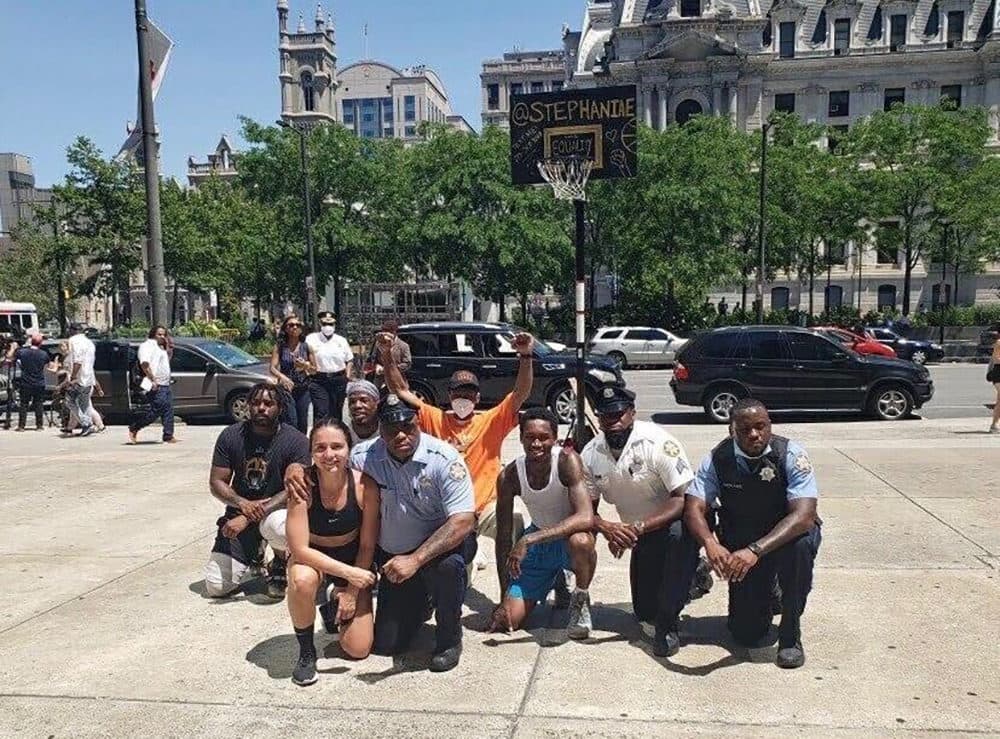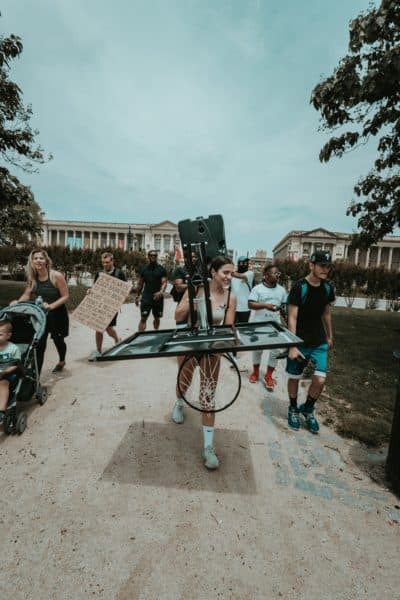Advertisement
'Basketball Peaceful Protest': Bringing People Together One-On-One
Resume
It was about a week ago that Stephania Ergemlidze had an idea. She wanted to take a portable basketball hoop to protest sites in Minneapolis. It was something she had done before in Philadelphia, where she lives.
"This is how I've seen in the past I've been able to bring people together," Stephiania says. "I thought, 'Why not try it now?' You know?"
Despite the pandemic, Stephania figured it was worth the risk. But there was one aspect of her trip that was going to be difficult to arrange on short notice.
"You know, I'm looking like, 'OK. Flights, easy. Hotel, easy. How in the world do I get a basketball hoop to Minneapolis?' " she remembers thinking.
After a search, Stephania found a new, unassembled hoop and checked it through oversized luggage.
"So it’s actually not as crazy as it sounds. But you definitely get some weird looks going into the airport when you have, like, a giant box, and on the front cover of the box is just like a basketball hoop picture," Stephania says. "Everybody’s kind of giving you this look, like, 'What are you doing?' "
KG: So before we talk about how this all got started, I don't want to give people the impression that you think that a basketball hoop is going to solve systemic racism. So, what is it that you're trying to do here?
SE: Obviously, basketball is not going to solve the problem. We were more looking towards trying to ease the tension, so that way there can be room for change, there can be room for communication. So, that way, maybe messages can get across. We saw protesters come and be excited that we were there with our hoop, you know, have like a little brightness during a really dark time right now, you know?
On the opposite side, on the police end as well, having them come and be part of the community again was something that I think is worth having at this period of time, you know, moving forward towards a more positive future.
KG: All right, so let's go back and talk about how this all started. And we might as well start at the beginning. You were not supposed to grow up to be a person who was good at playing basketball, right?
SE: No, no, no. I was actually born with a foot and leg condition where both of my legs were completely turned in. I'm missing bones in both of my feet, and my Achilles tendon is too short. And they told my parents, "You know, she will never be able to walk. She'll never be able to play sports, never run, nothing."
And so they actually put casts on my legs for the first three years of my life to straighten them. And then, at that point, they put me through tons of therapy, lots of tears, lots of pain. And they were like, "OK, you know, maybe we can get her walking at this point. But no sports, no, like, running, nothing." And my parents didn't really like that answer, so they put me into every sport possible. And I was in pain a lot. I still, to this day, am in a lot of pain when I do physical activity. I don't remember the last time I've played on non-sprained ankles. I always have some sort of injury.
But throughout my life, it's just been, like, "Does it hurt? Yeah. But do I want to do it? Is it something I love? Is it worth it to me? Yes." And, really, that's kind of how I've gotten to the spot that I'm at today. Now I carry basketball hoops around cities, and I play with guys in the streets. So if I can do it, anybody can do it, you know?
KG: All right. So this dragging basketball hoops around cities did not begin in the past couple of weeks. So, when and why did you start doing this?
SE: Yeah, so I started back last year — last July, probably. Because I make content. So I do Instagram, YouTube, TikTok, Twitch.
SE: It mostly started off as like, "Oh, I think this would be fun." I found a basketball hoop that was $120 or something like that. Called up my video guy, and I was like, "Hey, I ordered a basketball hoop." And he was like, "OK." I was like, "Yeah, we're gonna carry it around Philly and just play ball with people on the street." And I quickly hung up after that, because I didn't want him to tell me "No." You know, so he showed up. Luckily he showed up.
SE: It was really cool. Like, it was a really cool experience, because people of all different ethnicities, races, ages, gender, like, walks of life — like, everybody was just kind of hanging around. Either they were cheering, or they just wanted to be part of the environment, or they wanted to play, you know? And it just was really cool to see how the community came together through the sport of basketball. And so I figured I'd continue doing it. We had a whole tour planned, like to go across the U.S. and do this everywhere. And then, like, [the Coronavirus] hit, and it was kind of like, "OK, let me retire the hoop until this is all over."
You know, when all of this kind of erupted the past few weeks, I wanted to do something bigger, like, something more with my my platform. I didn't want to just make that post that everybody's making, where it's like, you know, "This is what I think about the situation at hand." It was kind of like, "Regardless of everything else happening this is what I need to do."
KG: So on Monday, June 1, you were looking for a spot to setup a hoop in downtown Philly. What happened?
SE: I hadn't seen the damage yet from all the looting and everything. And so, you know, put on my running shoes, put on my running clothes, everything. Went for a run to go check it out. Try to catch up with the protesters, see where they're at, how things are progressing. And I get to a point where I catch up to them. And I'm just, like, at first I'm running, right? And I'm thinking maybe I'm just really out of shape. Maybe I just haven't run in a long time. Like, I can't breathe right now, you know. I felt my air pipes were not getting the right air, you know? And so I smell smoke, like, maybe they're burning something weird? And then it hits me in my head police just let off these tear gas bombs, you know? And these people were just peacefully walking. At that point I was just, like — I was very angry. And I came home, and I made that video.
At that point in my head, it was just like, "This can't just be, like, me going around with my basketball hoop. Let me go and really try to do what I can to reunite my city, so that we can move forward and we can work together to move forward."
KG: So that first Tuesday morning when you brought out the hoop in Philly, what was going through your head as you walked out with it?
SE: I was so nervous. Oh, man. I called my friend. I was like, "I don't know, like, maybe I shouldn't do this. I'm nauseous right now. I feel like I'm gonna throw up. I don't know if this is the right decision or not." Because, you know, it's a very sensitive time, and it's — I didn't want the wrong message to come across. How do we do this in a way where it's not distracting from protests? How do I bring people together and show that we are a united community? You know, so I was so nervous. And then when we got out there, I was like, "OK, this is good."
SE: It went really well. We brought protesters together. We brought police together. Civilians, everybody. The next day, we went out again, and people were like, "We love what you're doing." You know, it was cool to see how the community received us, and received us in a positive way. There's always gonna be people that have a problem with what you're doing. People were like, "Why are you playing with the police?" But it's like, at the end of the day, the amount of positive that we're getting significantly outweighs the very few negative.
KG: Well, let's talk about playing with police. How do you get them to play with you? And why is that an effort that you do specifically?

SE: You know, everybody talks about white privilege. When I'm going up to police officers, I know that, like, I look very harmless. It's like this little white girl is carrying a basketball hoop with her. What could she possibly do wrong, you know? And that's a wrong mentality, right? Like, that shouldn't be how the mentality is. But I'm aware that that's what it is, right? So it's like, "Do you want to play? You want to play? Come on, play me one v. one," you know?
At the end of the day, police are supposed to be the ones protecting you. Once we do fix the system, if there's still this tension between police and civilians, that's not helpful to the community. We need that to be gone, too.
KG: And then you decided it was time to take this beyond Philadelphia. Take me through that decision.
SE: Friday night, I'm sitting there. I'm like, "I think I should go to Minneapolis." I knew it worked in our city. And I just wanted to see if we could try to recreate it there as well. You know, that's where I felt like — maybe that was, like, the place that needed it most at the time. But, honestly, when we got out there, they were already doing their thing. There's a big cookout, they have food drives, grocery food that you can take for free. Water, juices, drinks, whatever.
We're just playing basketball with everybody, and everybody's happy. And it was really cool to see how their community is healing during this time. And, in my opinion, it was really beautiful to see that. Because the media paints things in a way where it shows you that, like, everything is negative. They showed all the lootings, but I had no idea this was happening in Minneapolis. At the end of day, it's like, "Yeah, maybe we didn't have to ease any tension there, but I'm actually really happy about that." And, like, we just got to be part of the community.
This segment aired on June 13, 2020.




